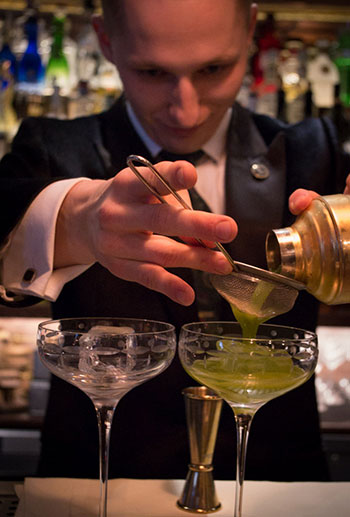Why do brands hold cocktail competitions?
Many bartenders enter competitions without giving this question a moment’s thought. They read a competition brief, create a tasty drink, and spend time writing a presentation, all without really understanding what the sponsor brand hopes to get out of the comp.
Building an entry in this way, without understanding why brands hold competitions, is a bit like inventing a cocktail for someone without knowing their flavour preferences – the resulting drink may be perfectly balanced, but there’s a good chance the customer won’t like it.
 If this is the first time you’ve thought about comps from the brands’ point of view, chances are phrases like ‘trade awareness’ or ‘bartender engagement’ will pop into your mind. While it is true that every brand wants to engage with bartenders, it is only as a means to an end. They aren’t really interested in you as such, they are interested in your customers, and what you serve them.
If this is the first time you’ve thought about comps from the brands’ point of view, chances are phrases like ‘trade awareness’ or ‘bartender engagement’ will pop into your mind. While it is true that every brand wants to engage with bartenders, it is only as a means to an end. They aren’t really interested in you as such, they are interested in your customers, and what you serve them.
To illustrate, imagine a fictitious vodka brand that spends £10 million a year on marketing. Some of that money might be allocated to Instagram influencers, some might go towards a Formula 1 sponsorship, and the rest might secure product placement in a few blockbuster movies. All of this is done to get inside the mind of a segment of society they believe is likely to buy their booze.
In our fictitious example, the vodka brand is attempting to associate itself with things that people of a certain demographic aspire to. When such a punter goes shopping in a supermarket or off licence, the brand’s hope is that, as a result of their marketing activities, he or she will buy the sponsor brand, and not one of its competitors.
The money spent by brands on consumer marketing is designed to shape and influence a customer’s buying decisions, and evidence that this works is all around us.
However this plan, and the money spent on implementing it, goes out the window when that same punter walks into a bar. With very few notable exceptions (Jack and Coke anyone?), consumers generally don’t brand-call spirits. So when a customer asks for a gin and tonic or a rum and coke in a well-stocked cocktail bar, sponsored social media posts and movie product placement go out the window, and the spirit served to the customer will be chosen by the bartender, who is driven by a difference set of motivators.
And that’s where cocktail competitions come in. Just as advertising and sponsorship are designed to shape the buying decisions of a customer out in the wild, the objective of a cocktail competition is to shape the decisions a bartender makes when he or she serves a spirit and mixer, creates a cocktail list, and does the stock order for their bar.
In other words, cocktail competitions are designed to turn bartenders into brand advocates.
What is brand advocacy?
 In a brand’s perfect world, bartenders would fall in love with a product while learning about it for a cocktail competition. Recipe experimentation would bring a deep appreciation for the liquid’s flavour and versatility, and presentation research would result in admiration for the brand’s history and authenticity. Upon winning the competition, these positive impressions will be reinforced by memories of an epic prize trip, and the brand subsequently becomes that bartender’s first choice and first recommendation in its category.
In a brand’s perfect world, bartenders would fall in love with a product while learning about it for a cocktail competition. Recipe experimentation would bring a deep appreciation for the liquid’s flavour and versatility, and presentation research would result in admiration for the brand’s history and authenticity. Upon winning the competition, these positive impressions will be reinforced by memories of an epic prize trip, and the brand subsequently becomes that bartender’s first choice and first recommendation in its category.
In the real world, such ‘total conversion’ probably never happens. In practice, a sponsor will consider a competition successful if the entrants have learned enough about the product and its qualities to make them more likely to use it, because once established, preference for a particular ingredient over its competitors can stay with a bartender throughout their career.
This process can be described as building brand advocacy. When put in terms useful to a competition entrant, it means that brand-affiliated judges will likely favour presentations which imply a relationship has been formed with the sponsor brand, and that this relationship will extend beyond the confines of the competition and begin to influence what the bartender recommends to his or her customers.
That’s all well and good, but how does it help me win comps?
The first (and possibly unpopular with any brand folk reading this) thing to bear in mind is that you don’t have to mean it. If you are entering a competition held by a brand you genuinely love, then an element of advocacy will naturally appear in your presentation. However, should you enter a competition for more pragmatic reasons – perhaps the prize is desirable, or it will be good for your career – it is possible to, for want of a better term, fake it. In either case, here are four practical things you can do to tick the ‘advocacy’ box on the judges’ mental score sheets:
Put your entry cocktail on your bar’s menu – Bring a copy of the menu to the competition if possible, and tell the judges how well the drink is selling. If your bar is part of a group, get the other venues to list it too. All of this tells the judges your relationship with the competition, and therefore the brand, is love, not a one night stand.
Smart social media – Post updates while devising your entry and in the lead up to the competition. Find out if there is an official hashtag and include it in your posts, and tag the brand ambassador. When you share a photo of your drink, make sure there’s a bottle of the spirit somewhere in the frame. If your social media posts do well, make a note of the number of likes and shares, and tell the judges.
Talk about your customers – If your bar has a social media presence, post from that too. This exposes your entry to members of the public. During your presentation, talk about your customers’ reaction to the cocktail, and describe how you have encouraged them to try it. Engagement with consumers is the epitome of brand advocacy.
Talk about the future – During your presentation, instead of displaying your research by rattling off a list of facts and dates from the brand’s past, talk about how you will use what you have learned going forward. Imply that your new-found appreciation for the product has changed the way you view the category, and that it will be a permanent fixture on your back bar.
That seems like hard work, I can’t be arsed
I don’t blame you. Typing the words ‘consumer marketing’ and ‘brand advocacy’ is depressing, let alone having to embody what they represent. However, if you are prepared to invest the time and energy it requires to enter a cocktail competition, especially at the global level, it makes sense to do everything you can to ensure the investment pays off. Understanding what the sponsor brand wants from a competition, and going the extra mile to use that knowledge and score a couple of extra points, could well be the difference between an early exit, or winning your first major final.


